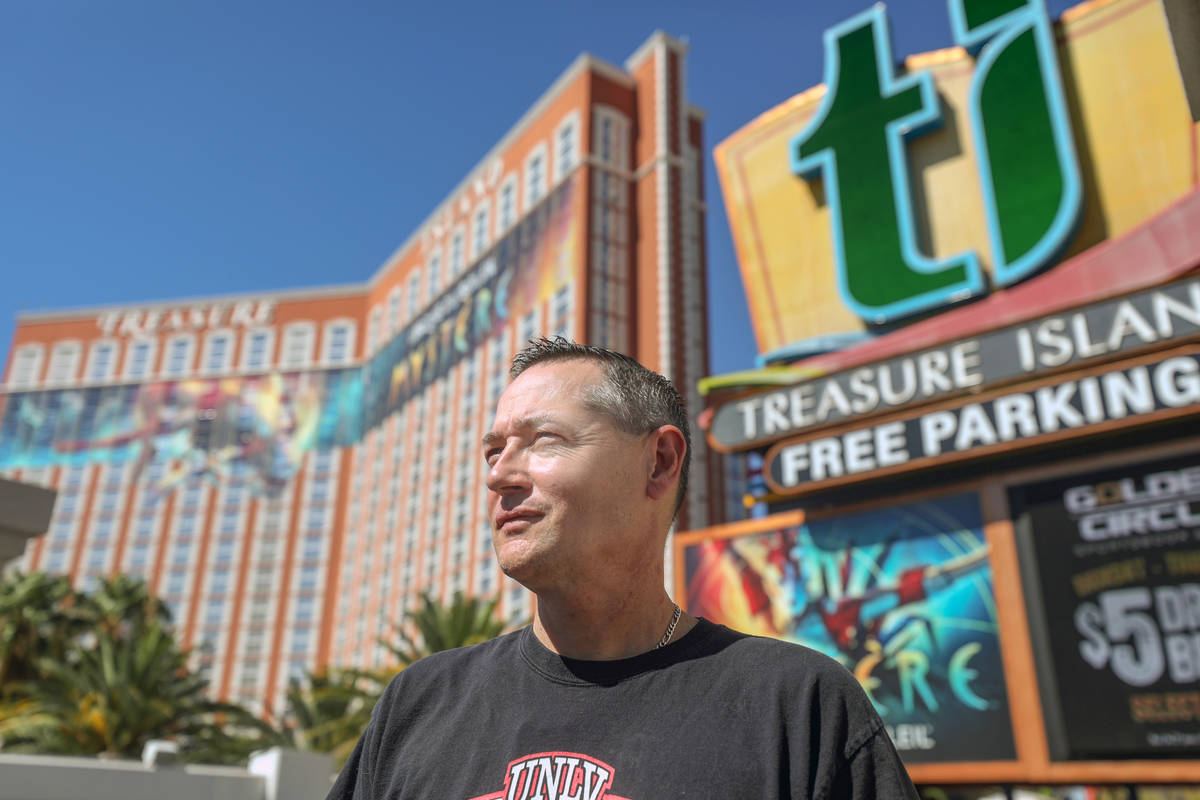Las Vegas workers reflect on workplace changes since COVID-19
It’s a Labor Day weekend like no other: Thousands of Nevadans are jobless, and neighborhood barbecues pose a public safety hazard.
Among those are working, some feel a greater impact of the coronavirus pandemic than others. Yet, no field is completely spared its effects.
To commemorate Labor Day, the Review-Journal spoke with workers in different fields and positions to capture a snapshot of how the pandemic has — and hasn’t — changed the workplace.
Todd Henderson
Treasure Island ticket writer
Treasure Island employee Todd Henderson was called back to work at the end of July, once sports started ramping up again.
The ticket writer said the best part about returning to work after a four-month furlough has been seeing coworkers and guests again.
“It’s good to get out and socialize,” said Henderson, who’s worked at the property for eight years. “We get quite a few regulars who always come back. … It’s good to see them, it’s good to see they’re healthy.”
His job hasn’t changed much over the past few months, aside from the addition of face masks and more sanitation measures — constant reminders that there is an ongoing pandemic.
“It’s cool, in a way,” Henderson said of the masks. “You see different styles and different looks and saying and flags. It’s a fashion statement now.”
— Bailey Schulz
Jerry Bates
Republic Services sanitation driver
Jerry Bates, a sanitation truck driver at the Republic Services for the last 29 years, arrives at the transfer station by 5:45 a.m. and is on the road by 6:05, collecting waste along his assigned route.
His truck picks up trash from more than 1,275 Southern Nevada households a day and his shift usually ends around 3:30 p.m.
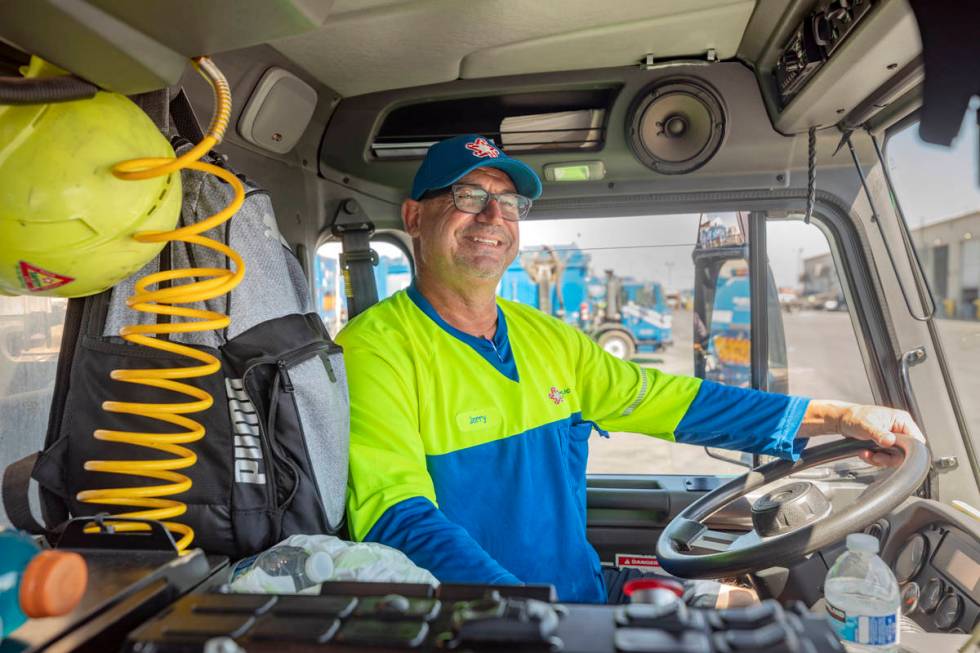
Except now he does it all while wearing a mask.
“You’ve got to be careful that you don’t want to bring it home to your family,” said Bates, 56, adding that he sees his grandkids every weekend, “so I really watch what I do. As soon as I get home, clothes come off and I go straight into the shower and be done.”
At the onset of the pandemic when people quarantined and worked from home, trash went up.
Republic Services said that while it saw upwards of a 30 percent increase in waste production since the pandemic, it’s “transitionary” since the commercial trash volume has decreased drastically.
“It’s amazing what people are doing with their homes now as you look and drive down the streets,” said Bates. “You’ll see people repainting outside their homes, redoing their landscape, remodeling, putting new windows and furniture in.”
— Jonathan Ng
Beshara Fadel
Uber driver
Business has been good for rideshare driver Beshara Fadel.
The 49-year-old Henderson resident said he has little competition on the road these days. He said he made almost $400 on a recent Friday.
Fadel, who’s driven for Lyft and Uber for about 2 1/2 years, temporarily quit driving from March through June and claimed unemployment benefits under the program for independent contractors, Pandemic Unemployment Assistance. He said he got back behind the wheel after seeing potential for a bigger check.
“I got tired of being home,” he added. “I gained 20 pounds in those three months.”
Prior to the pandemic, Fadel would sit at McCarran International Airport’s rideshare lot and wait his turn to pick up arriving travelers. There could be as many as 30 to 100 Uber vehicles waiting, he said. Not anymore.
“It’s just like nonstop,” Fadel said. “We don’t even have to wait at the lot. We just get call after call after call after call.”
Fadel upgraded from a Toyota Camry to a Honda Pilot about two weeks ago. Now he can seat more passengers and drive as an UberXL, when before he drove as an UberX.
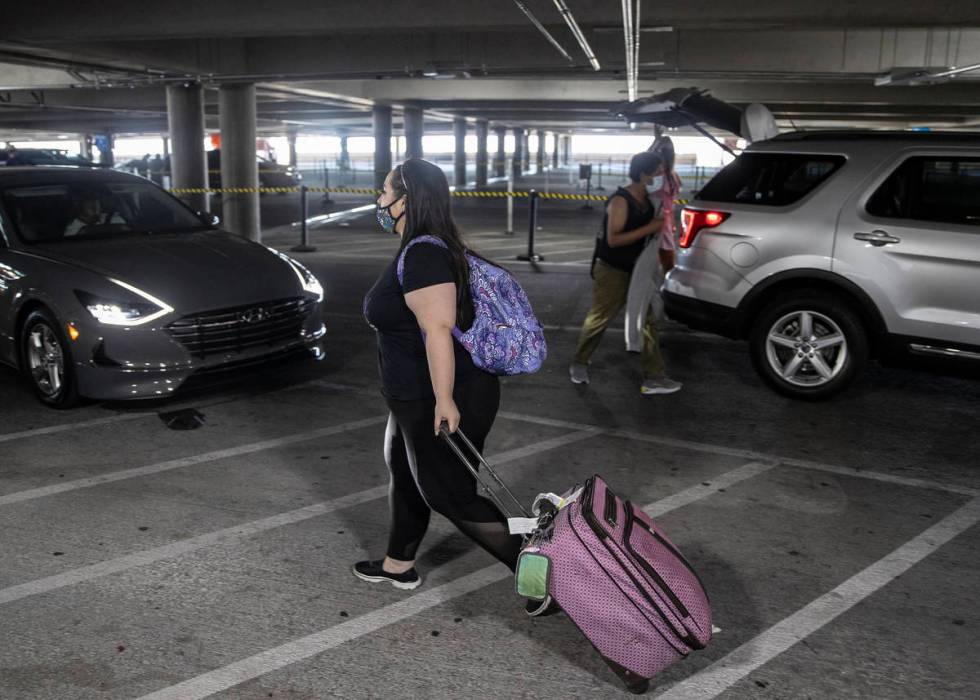
Uber changed its UberX passenger limit from four to three as a result of the pandemic, meaning a quartet seeking a ride has to pay more for the larger-capacity Uber XL.
Ultimately, this allows him to give fewer rides and make as much as, if not more than, he previously did, Fadel said.
Spending less time on the road allows him to take more breaks, lower his chances of getting into a crash and limit his exposure to the novel coronavirus, he said.
Fadel said he’s “very worried” about the possibility of coming down with COVID-19 from one of his passengers. He sanitizes the SUV after every ride, and the stickers he placed on its body warn customers: No mask, no entry.
Additionally, Fadel sets his car’s air conditioning to pull air from the outside in lieu of recycling air in the cabin.
“The other day someone coughed in my car and I had to put down the window,” he said.
— Mike Shoro
Cassie Catania-Hsu
Las Vegas market leader, CBRE Group
After working in Southern Nevada commercial real estate for more than a decade, Cassie Catania-Hsu was hired in June as the new boss for prominent brokerage firm CBRE Group’s Las Vegas office.
That office, however, is closed because of the coronavirus pandemic, so Catania-Hsu, like countless others who have been exiled from their buildings, is working from home.
“Definitely strange times to start a new job,” she said.
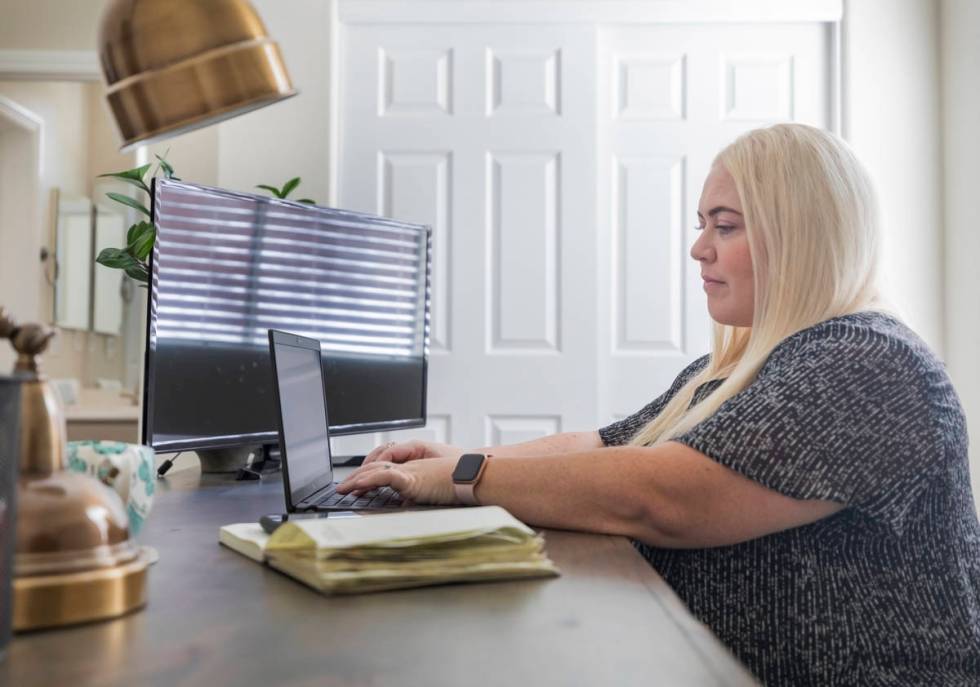
Unlike many people stuck at home, she has the place to herself, save for the family dog. Her husband is back in his office, and her 3½-year-old daughter is attending preschool.
On a typical day, Catania-Hsu drops her daughter off around 7:45 a.m. and starts working at 8.
She picks up her daughter, Brooklyn, around 5:30 p.m. and then exercises in her garage. Afterward, they eat dinner, her daughter goes to sleep, and Catania-Hsu works for maybe another hour before going to sleep and “getting up and doing it all over again.”
She has adjusted to the routine and feels like she has connected with more people on a personal level by getting a window into their homes through Zoom meetings.
Still, she noted, “I cannot wait to go back to the office.”
— Eli Segall
Julia Greenman
Executive director of restaurant operations, Wynn Las Vegas and Encore
Julia Greenman considers herself fortunate.
Unlike many other casino employees in Las Vegas, the executive director of restaurant operations for Wynn Las Vegas and Encore was able to continue working during the state-mandated casino shutdowns from mid-March until early June. She said that time was spent helping plan the properties’ reopenings via Zoom calls and operating dining options for staff members still at work.
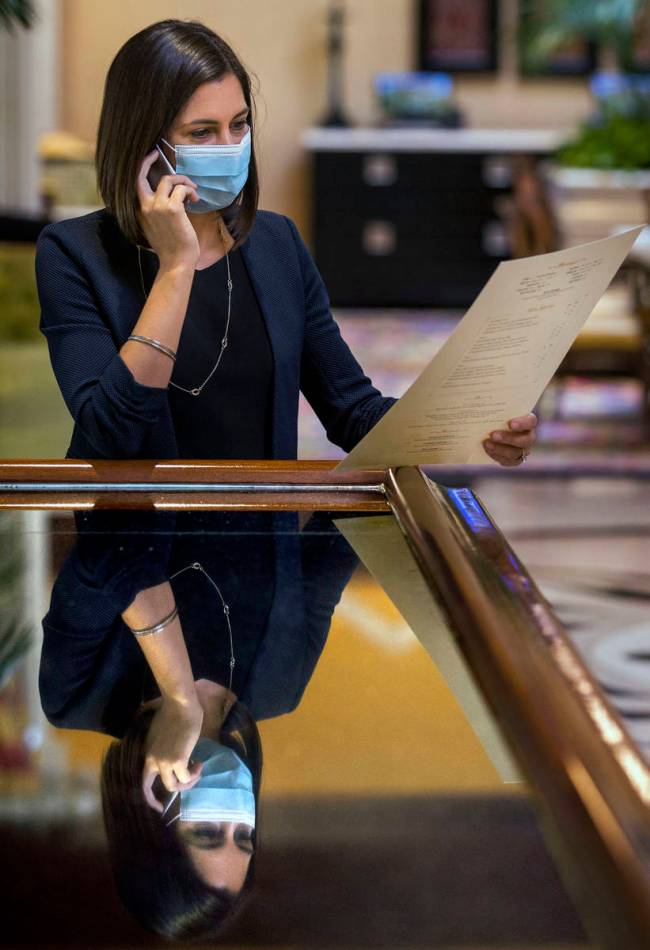
“I think everyone (at the company) felt fortunate,” said Greenman, referencing the company’s decision to offer both full- and part-time U.S. employees benefits, wages and an estimate of their tips through May 15.
When Wynn Las Vegas and Encore reopened their doors June 4, staff members’ faces were covered with masks, and restaurant tables were spaced apart to allow for social distancing.
Greenman said it was comforting knowing these steps were meant to keep people safe.
“It’s something that you, psychologically, overcome pretty quickly,” she said. “(The changes have) actually been really good for guest service and making sure we’re really able to devote time to every guest that comes in.”
— Bailey Schulz
Windom Kimsey
Owner, TSK Architects
TSK Architects’ office in downtown Henderson has room for about 40 workers, but these days, only four come in.
“Everybody’s really spread out,” owner Windom Kimsey said.
Most of the staff is working from home, he said, adding one employee just left for Hawaii to work remotely there for six months.
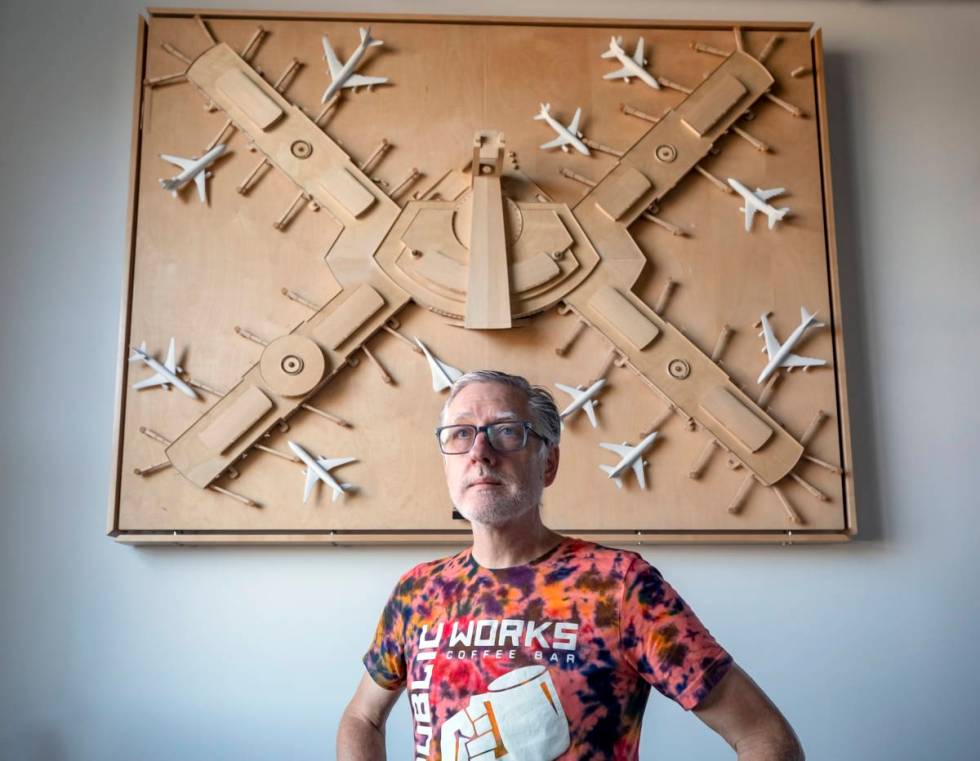
There are pros and cons of being in a mostly empty office, Kimsey said. People wear jeans and T-shirts, and there is less drama, but he misses chatting with people and the office culture.
For now, with the pandemic still raging and no vaccine available, he sees no need to bring everyone back to the office this year.
— Eli Segall
Kathleen Cox
Wells Fargo district manager
Kathleen Cox, a district manager with Wells Fargo, started as a bank teller 29 years ago and rose up through the ranks. She now oversees more than 150 employees across 10 locations in the valley.
At the start of the pandemic, the banks’ drive-thrus were busy with cars lining up outside, she said.
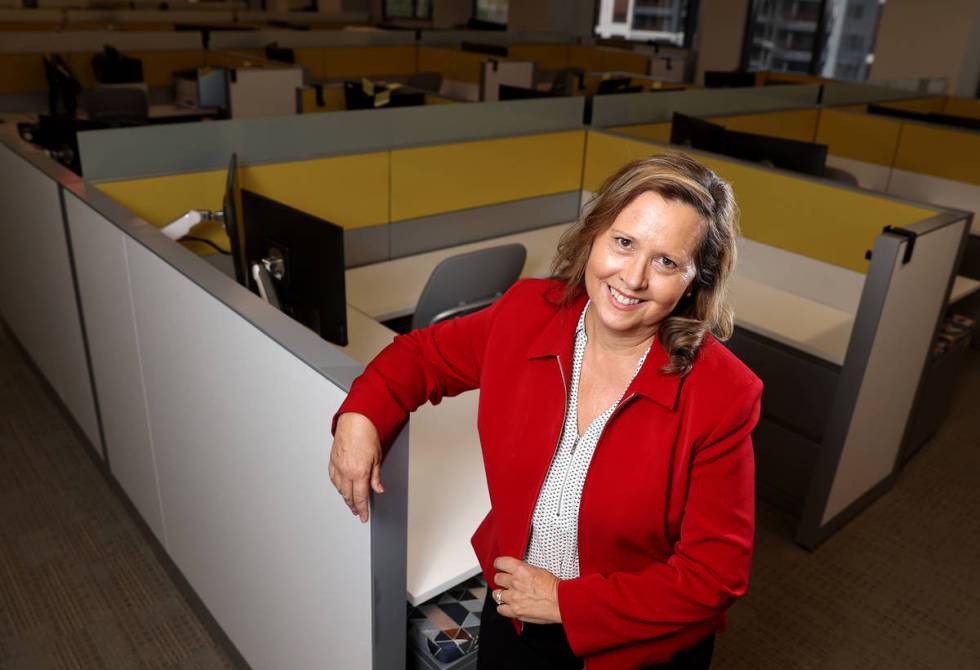
“We’ve definitely seen a shift now from them coming in as much, they are using our ATMs more, and we definitely have seen an increase in our mobile deposit and our online banking services being used more for sure,” said Cox.
Banks had a window glass barrier for tellers long before the pandemic. But Cox said now plexiglass also stands at bankers’ desks for those who meet with customers. There is also a lot more cleaning going on.
“Our employees have a new job, as lobby leader, we call it, where they are basically enforcing the number of customers and team members combined that we have in the branch, making sure that we don’t go over the limit that we have figured out,” Cox said.
She used to spend most of her time at the branches she oversees, but not anymore.
Cox said she’s adapted to holding virtual meetings with her employees and customers, and said she plans to use virtual tools more “when things get back to whatever the new normal is.”
— Jonathan Ng




